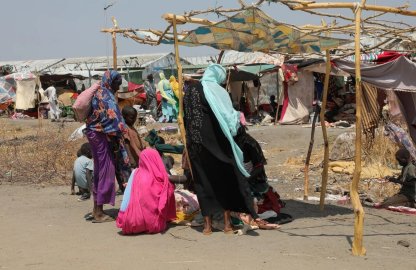Sudan’s Refugee Crisis Escalates Amid Food Aid Shortages
The ongoing conflict in Sudan has led to a **devastating refugee crisis**, with millions fleeing their homes in search of safety and basic necessities. As the situation deteriorates, access to food aid has become increasingly dire, exacerbating the plight of those who have been displaced. The humanitarian implications of this crisis are profound, as organizations struggle to provide support amidst dwindling resources.
The Current State of Refugees in Sudan
Sudan’s ongoing conflict has forced a staggering number of individuals to seek refuge in neighboring countries. Reports indicate that over **2 million people** have been displaced since the outbreak of violence, leading to a humanitarian emergency that is only worsening. The need for food assistance has never been more critical, as many refugees find themselves without access to essential resources.
- Food Insecurity: Many refugees are unable to secure enough food, leading to malnutrition and other health complications.
- Increased Vulnerability: Women and children are particularly affected, facing heightened risks of exploitation and violence.
- Strain on Host Countries: Neighboring nations are struggling to accommodate the influx of refugees, leading to tensions and resource shortages.
Challenges Facing Humanitarian Aid Organizations
Humanitarian organizations are working tirelessly to provide assistance, but they are encountering numerous challenges:
1. **Funding Shortages:** Many organizations, including the UN and various NGOs, have reported significant drops in funding. This has hindered their ability to deliver essential services.
2. **Logistical Issues:** The ongoing conflict makes it difficult to transport aid effectively, with many regions remaining inaccessible due to violence.
3. **Political Barriers:** The political climate in Sudan complicates efforts to provide assistance. Restrictions imposed by authorities can hinder the distribution of food and other necessary supplies.
Impact on Food Aid Programs
Food aid programs play a crucial role in mitigating the effects of hunger among refugees. However, as **food aid runs dry**, the consequences for displaced populations are dire:
– **Rising Hunger Levels:** The lack of food assistance has led to **increased rates of malnutrition**, especially among children and vulnerable populations.
– **Dependence on Local Markets:** As aid decreases, refugees are forced to rely more on local markets, where prices are often inflated due to demand and supply issues.
– **Psychological Impact:** The stress of food insecurity can lead to mental health challenges, compounding the trauma already experienced by refugees.
The Role of International Community
The international community has a crucial role to play in addressing the refugee crisis in Sudan. It is essential to prioritize funding for humanitarian efforts and ensure that aid reaches those in need. Collaborative initiatives can help alleviate some of the burdens faced by refugees.
– **Increased Funding for Aid Organizations:** Governments and private donors must step up to provide the necessary financial support that organizations require to operate effectively.
– **Advocacy for Refugee Rights:** Upholding the rights of refugees is paramount. Advocacy efforts should focus on ensuring that displaced individuals receive the protection and assistance they deserve.
– **Long-term Solutions:** While immediate aid is critical, there is also a need for long-term strategies to address the root causes of the crisis, including political instability and economic challenges in Sudan.
Conclusion
The **refugee crisis in Sudan** continues to escalate as food aid shortages worsen the situation for millions of displaced individuals. It is imperative for the international community to take urgent action to support humanitarian efforts and address the ongoing challenges faced by refugees. Ensuring access to food and basic necessities is vital for their survival and dignity. The time for action is now, as the future of countless lives hangs in the balance.
As we navigate the complexities of this crisis, we must remember that every effort counts in making a difference in the lives of those affected by conflict and displacement.










